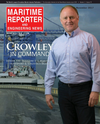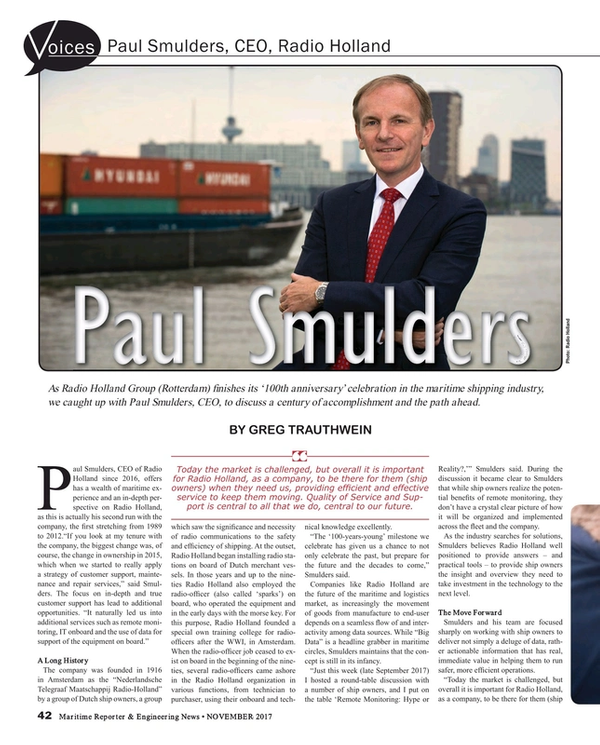
Voices: Paul Smulders, CEO, Radio Holland
By Greg Trauthwein
As Radio Holland Group (Rotterdam) finishes its ‘100th anniversary’ celebration in the maritime shipping industry, we caught up with Paul Smulders, CEO, Radio Holland, to discuss a century of accomplishment and the path ahead.
Paul Smulders, CEO of Radio Holland since 2016, offers has a wealth of maritime experience and an in-depth perspective on Radio Holland, as this is actually his second run with the company, the first stretching from 1989 to 2012.
“If you look at my tenure with the company, the biggest change was, of course, the change in ownership in 2015, which when we started to really apply a strategy of customer support, maintenance and repair services,” said Smulders. The focus on in-depth and true customer support has lead to additional opportunities. “It naturally led us into additional services such as remote monitoring, IT onboard and the use of data for support of the equipment on board.”
A Long History
The company was founded in 1916 in Amsterdam as the "Nederlandsche Telegraaf Maatschappij Radio-Holland" by a group of Dutch ship owners, a group which saw the significance and necessity of radio communications to the safety and efficiency of shipping. At the outset, Radio Holland began installing radio stations on board of Dutch merchant vessels. In those years and up to the nineties Radio Holland also employed the radio-officer (also called 'sparks') on board, who operated the equipment and in the early days with the morse key. For this purpose, Radio Holland founded a special own training college for radio-officers after the WWI, in Amsterdam. When the radio-officer job ceased to exist on board in the beginning of the nineties, several radio-officers came ashore in the Radio Holland organization in various functions, from technician to purchaser, using their onboard and technical knowledge excellently.
“The ‘100-years-young’ milestone we celebrate has given us a chance to not only celebrate the past, but prepare for the future and the decades to come,” Smulders said.
Companies like Radio Holland are the future of the maritime and logistics market, as increasingly the movement of goods from manufacture to end-user depends on a seamless flow of and interactivity among data sources. While “Big Data” is a headline grabber in maritime circles, Smulders maintains that the concept is still in its infancy.
“Just this week (late September 2017) I hosted a round-table discussion with a number of ship owners, and I put on the table ‘Remote Monitoring: Hype or Reality?,’” Smulders said. During the discussion it became clear to Smulders that while ship owners realize the potential benefits of remote monitoring, they don’t have a crystal clear picture of how it will be organized and implemented across the fleet and the company.
As the industry searches for solutions, Smulders believes Radio Holland well positioned to provide answers – and practical tools – to provide ship owners the insight and overview they need to take investment in the technology to the next level.
The Move Forward
Smulders and his team are focused sharply on working with ship owners to deliver not simply a deluge of data, rather actionable information that has real, immediate value in helping them to run safer, more efficient operations.
“Today the market is challenged, but overall it is important for Radio Holland, as a company, to be there for them (ship owners) when they need us, providing efficient and effective service to keep them moving. Quality of Service and Support is central to all that we do, central to our future,” said Smulders.
In ‘being there’ he means both in person and remotely, consulting regarding specific problems and needs, meanwhile helping owners and managers employ best practices in the monitoring and maintenance of critical shipboard systems.
“Our sweet spot is making use of the data to support the onboard equipment, and reduced maintenance costs for the ship owner,” said Smulders. “It is my view that we should not inundate ship owners with a lot of data. We take the angle of ‘let’s make use of data onboard ships to help maintain equipment onboard the ships; how can we apply the data we receive from the equipment to better determine when it needs to be maintained. So our stance is a limited amount of data, maximum support of actionable information to support equipment maintenance.”
But in working with a conservative ownership in a down market, Smulders knows that his team must prove with tangible example the power of the digital solutions at hand. “What I’ve noticed in discussion with ship owners is they do not have a clear picture of what it can do for them,” he said. “They are concerned about receiving too much data, getting lost in the data and not knowing what to do with it. They don’t want to spend a lot of money on a solution if they are not clear on how it is going to help them.”
To that end Radio Holland can create ‘dashboards’ to make the data compact and ‘overviewable’ in a quick and efficient way. The Dashboards can contain various key data, depending on what the ship owner would like to see.
While Smulders and his team are plenty busy in the present, this CEO enthusiastically eyes the future, and he knows that his top investment (and his top challenge) is attracting the right young people to the business. “To attract young people and to show them the possibilities. It is high technology, it is satellite communications, it is international.” We need to show them the promise of maritime, the future of Radio Holland, said Smulders.
(As published in the November 2017 edition of Maritime Reporter & Engineering News)
Read Voices: Paul Smulders, CEO, Radio Holland in Pdf, Flash or Html5 edition of November 2017 Maritime Reporter
Other stories from November 2017 issue
Content
- The Challenge of Marine Asset Appraisal page: 12
- US Navy: Back to Basics page: 16
- The Best Options for Safe Mooring page: 18
- Deck Machinery: Five Stress Areas page: 20
- Five Requirements for Safe Ops page: 22
- How Augmented Reality Technology Could Transform Shipping page: 26
- Eye on Design: C-DRONE page: 28
- IMO Orders Fuels of the Future page: 30
- Voices: Howard Fireman, SVP & CTO, ABS page: 32
- Inside the World's First LNG Containership Conversion page: 36
- Voices: Paul Smulders, CEO, Radio Holland page: 42
- Voices: Rich Merhige, President/Owner, AME page: 44
- A New Breed of Tug page: 54
- Wind Energy Workboats: A US Offshore Build-up page: 60
- Bouchard Set to Celebrate a Century page: 66
- Strategic Marine: Innovative Quality page: 67
- Interferry: Diverse Operations Common Successes page: 68
- Voices: Paulo Cesar P. Freitas, Norsul page: 72
- Managing the New Panamax Containerships page: 80
- Coatings & Corrosion Control Take Center Stage page: 84
- W&O Supply Holds a Steady Course page: 90


